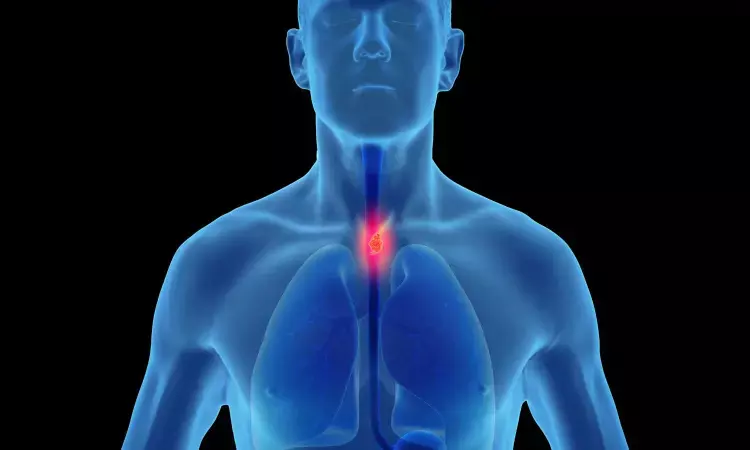- Home
- Medical news & Guidelines
- Anesthesiology
- Cardiology and CTVS
- Critical Care
- Dentistry
- Dermatology
- Diabetes and Endocrinology
- ENT
- Gastroenterology
- Medicine
- Nephrology
- Neurology
- Obstretics-Gynaecology
- Oncology
- Ophthalmology
- Orthopaedics
- Pediatrics-Neonatology
- Psychiatry
- Pulmonology
- Radiology
- Surgery
- Urology
- Laboratory Medicine
- Diet
- Nursing
- Paramedical
- Physiotherapy
- Health news
- Fact Check
- Bone Health Fact Check
- Brain Health Fact Check
- Cancer Related Fact Check
- Child Care Fact Check
- Dental and oral health fact check
- Diabetes and metabolic health fact check
- Diet and Nutrition Fact Check
- Eye and ENT Care Fact Check
- Fitness fact check
- Gut health fact check
- Heart health fact check
- Kidney health fact check
- Medical education fact check
- Men's health fact check
- Respiratory fact check
- Skin and hair care fact check
- Vaccine and Immunization fact check
- Women's health fact check
- AYUSH
- State News
- Andaman and Nicobar Islands
- Andhra Pradesh
- Arunachal Pradesh
- Assam
- Bihar
- Chandigarh
- Chattisgarh
- Dadra and Nagar Haveli
- Daman and Diu
- Delhi
- Goa
- Gujarat
- Haryana
- Himachal Pradesh
- Jammu & Kashmir
- Jharkhand
- Karnataka
- Kerala
- Ladakh
- Lakshadweep
- Madhya Pradesh
- Maharashtra
- Manipur
- Meghalaya
- Mizoram
- Nagaland
- Odisha
- Puducherry
- Punjab
- Rajasthan
- Sikkim
- Tamil Nadu
- Telangana
- Tripura
- Uttar Pradesh
- Uttrakhand
- West Bengal
- Medical Education
- Industry
Antireflux surgery not better than medical therapy for reducing risk of esophageal adenocarcinoma in Barrett's esophagus

In patients with Barrett's esophagus (BE), antireflux surgery controls reflux symptoms and heals reflux-induced esophageal mucosal inflammation. This prevents the progression of BE to adenocarcinoma. The antireflux surgery and ablative endoscopic therapy disrupts the progression of BE to cancer.
However, in a recent study published in Gastroenterology, patients who underwent antireflux surgery do not have a lower risk of EAC than those using antireflux medications. Conversely, EAC risk increased over time in those who underwent antireflux surgery.
This multinational population-based cohort study investigated incident esophageal adenocarcinoma risk in patients with Barrett’s esophagus (N = 33,939) treated with antireflux surgery compared to those who did not undergo surgery but were treated with proton pump inhibitors. The patients were followed for 32 years. EAC risk was calculated using multivariable Cox regression, providing hazard ratios (HR) with 95% confidence intervals (CI) adjusted for age, sex, country, calendar year, and comorbidity.
In patients with Barrett’s esophagus, antireflux treatment is recommended to reduce EAC. Antireflux surgery counteracts gastroesophageal reflux of all types of carcinogenic gastric content. This reduces esophageal acid exposure to a greater extent than antireflux medication like proton pump inhibitors.
The key results of the study are:
- 33,939 patients had Barrett’s esophagus.
- 542 patients constituting 1.6%, had undergone antireflux surgery.
- During follow-up, there was no decrease in overall HR in those having undergone antireflux surgery than non-operated patients using antireflux medication but rather increased with adjusted HR of 1.9.
- With longer follow-ups, HRs did not decrease. Instead, there was an increase for each follow-up category, from 1.8 within 1-4 years of follow-up to 4.4 after 10-32 years of follow-up.
They said that compared to antireflux medication, patients with Barrett’s esophagus who undergo antireflux surgery do not have a lower risk of esophageal adenocarcinoma.
Reference:
Åkerström, J. H., Santoni, G., Von Euler Chelpin, M., Ness-Jensen, E., Kauppila, J. H., Holmberg, D., & Lagergren, J. (2023). Antireflux surgery versus antireflux medication and risk of esophageal adenocarcinoma in patients with Barrett’s esophagus. Gastroenterology. https://doi.org/10.1053/j.gastro.2023.08.050
BDS, MDS in Periodontics and Implantology
Dr. Aditi Yadav is a BDS, MDS in Periodontics and Implantology. She has a clinical experience of 5 years as a laser dental surgeon. She also has a Diploma in clinical research and pharmacovigilance and is a Certified data scientist. She is currently working as a content developer in e-health services. Dr. Yadav has a keen interest in Medical Journalism and is actively involved in Medical Research writing.
Dr Kamal Kant Kohli-MBBS, DTCD- a chest specialist with more than 30 years of practice and a flair for writing clinical articles, Dr Kamal Kant Kohli joined Medical Dialogues as a Chief Editor of Medical News. Besides writing articles, as an editor, he proofreads and verifies all the medical content published on Medical Dialogues including those coming from journals, studies,medical conferences,guidelines etc. Email: drkohli@medicaldialogues.in. Contact no. 011-43720751


